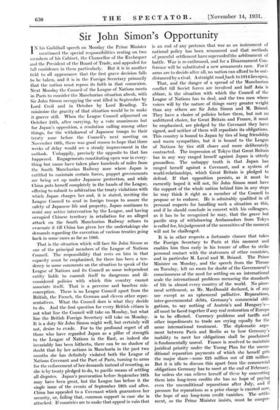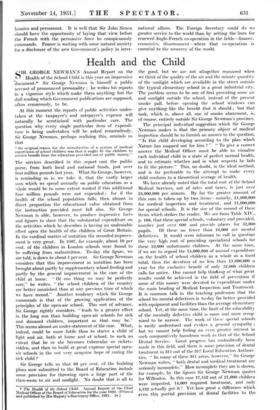Sir John Simon's Opportunity
IN his Guildhall speech on Monday the Prime Minister I- mentioned the special responsibilities resting on two members of his Cabinet, the Chancellor of the Exchequer and the President of the Board of Trade, and appealed for full confidence in them particularly. But it is in another field to all appearance that the first grave decision falls to be taken, and it is in the Foreign Secretary primarily that the nation must repose its faith in that connexion.
Next Monday the Council of the League of Nations meets in Paris to consider the Manchurian situation afresh, with Sir John Simon occupying the seat filled in September by Lord Cecil and in October by Lord Reading. To minimize the gravity of that situation would be to make it graver still. When the League Council adjourned on October 24th, after carrying, by a vote unanimous but for Japan's opposition, a resolution calling among other things, for the withdrawal of Japanese troops to their treaty zone before the Council's next meeting on November 16th, there was good reason to hope that three weeks of delay would see a steady improvement in the outlook. Unhappily, precisely the opposite to that has happened. Engagements constituting open war in every- thing but name have taken place hundreds of miles from the South Manchurian Railway zone where Japan is entitled to maintain certain forces, puppet governments are being set up under Japanese protection, and while China puts herself completely in the hands of the League, offering to submit to arbitration the treaty violations with which Japan charges her and, it is stated, inviting the League Council to send in foreign troops to assure the safety of Japanese life and property, Japan continues to resist any active intervention by the League, and having occupied Chinese territory in retaliation for an alleged attack on the South Manchurian Railway refuses to evacuate it till China has given her the undertakings she demands regarding the execution of various treaties going back in some cases as far as 1905.
That is the situation which will face Sir John Simon as one of the principal members of the League of Nations Council. The responsibility that' rests on him in that capacity must be emphasized, for there has been a ten- dency in some comments on the situation to speak of the League of Nations and its Council as some independent entity liable to commit itself to dangerous and ill- considered policies with which this country cannot associate itself. That is a perverse and baseless' mis- conception. There is no League Council apart from the British, the French, the German and eleven other repre- sentatives. What the Council does is what they decide to do. And the first question for every British citizen is not what line the Council will take on Monday, but what line the British Foreign Secretary will take on Monday. It is a duty Sir John Simon might well, but certainly will not, desire to evade. For to the profound regret of all those who have regarded Japan as a pillar of strength to the League of Nations in the East, as indeed she invariably has been hitherto, there can be no shadow of doubt that by her actions in Manchuria in the past two months she has definitely violated both the League of Nations Covenant and the Pact of Paris, turning to arms for the enforcement of her demands instead of resorting, as she is by treaty pledged to do, to pacific means of settling all disputes. Japan's provocation before September 18th may have been great, but the League has before it the single issue of the events of September 18th and after. China has appealed to a Covenant which guarantees, her security, or, failing' that, common support in case she is attacked. If countries are to make that appeal in vain that is an end of any pretence that war as an instrument of national policy has been renounced and that methods of peaceful settlement have superseded the arbitrament of battle. War is. re-enthroned, and for a Disarmament Con- ference will be substituted a new armaments race. For if arms are to decide after all, no nation can afford to be out- distanced by a rival. A straight road back to 1914 lies open. That, and the danger of a spread of the Manchurian conflict till Soviet forces are involved and half Asia is ablaze, is the situation with which the Council of the League of Nations has to deal, and the two men whose voices will by the nature of things carry greater weight than any others are Sir John Simon and M. Briand.
They have a choice of policies before them, but not an unfettered choice, for Great' Britain and France, it must be emphasized, are pledged by the Covenant they have signed, and neither of them will repudiate its obligations. This country is bound to Japan by ties of long friendship and warm sympathies, but it is bound to the League of Nations by ties still closer and more deliberately contracted. The impression at Tokyo that Great Britain has in any way ranged herself against Japan is utterly groundless. The unhappy truth is that Japan has ranged herself against a Covenant, and a system of world-relationships, which Great Britain is pledged to defend. If that opposition persists, as it must be earnestly hoped it will not, Sir John Simon must have the support of the whole nation behind him in any steps he may think it right as a member of the Council to propose or to endorse. He is admirably qualified in all personal respects for handling such a situation as this, and if he should conclude in concert with his colleagues, as it has to be recognized he may, that the grave but pacific step of withdrawing Ambassadors from Tokyo is called for, his judgement of the necessities of the moment will not be challenged.
It is in other respects a fortunate chance that takes the Foreign Secretary to Paris at this moment and enables him thus early in his tenure of office to strike personal contact with the statesmen of other' countries, and in particular M. Laval and M. Briand. The Prime Minister on Monday, and the speech from the Throne on Tuesday, left no room for doubt of the Government's consciousness of the need for settling on an international scale the international problems menacing the standards of life in almost every country of the world. No piece- meal settlement, as Mr. MacDonald declared, is of any use except as an ephemeral palliative. Reparations, inter-governmental debts, Germany's commercial obli- gations, to say nothing of Austria's and Hungary's— all must be faced together if any real restoration of Europe is to be effected. Currency problems and tariffs and other impediments to trade are crying equally for the same international treatment. The diplomatic argu- ment between Paris and Berlin as to how Germany's inability to meet her obligations shall be proclaimed is fundamentally unreal. France is resolved to maintain juridical priority under the Young Plan for the uncon- ditional reparation payments of which she herself get, the major share—some £25 million out of £33 million. But it is idle to discuss this apart from the commercial obligations Germany has to meet at the end of February, for unless she can relieve herself of these by converting them into long-term credits she has no hope of paying even the unconditional reparations after July, and if pressure for reparations as a prior charge is exerted now, the hope of any long-term credit vanishes. The settle- ment, as the Prime Minister insists, must be compre- pensive and permanent. It is well that Sir John Simon should have the opportunity of laying that view before the French with the persuasive force he conspicuously commands. France is waiting with some natural anxiety for a disclosure of the new Government's policy in inter- national affairs. The Foreign Secretary could do no greater service to the world than by setting the lines for renewed Anglo-French co-operation in the fields—finance, economics, disarmament—where that co-operation is essential to the recovery of the world.



































 Previous page
Previous page